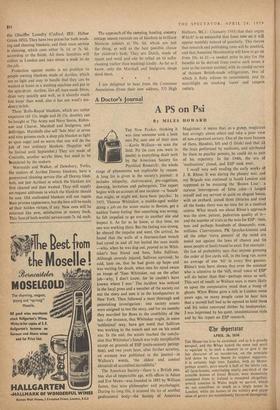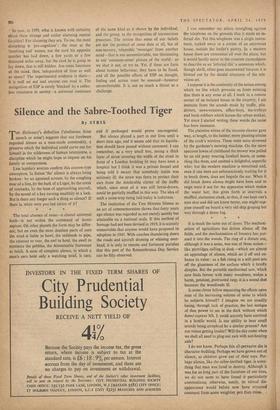A Doctor's Journal
A PS on Psi
By MILES HOWARD
THE New Yorker, thinking it was time someone took a look into Psi, sent one of their men —Kevin Wallace—to scan the field. Psi (in case you were in doubt) is everything dealt with by the American Society for Psychical Research : the whole range of phenomena not explicable by reason. A long list is given in the society's journal : it includes telepathy, clairvoyance, pre-cognition, dowsing, levitation and poltergeists. The report begins with an account of one incident—a 'hunch' that might, or might not, have been 'psychic.' In 1955, Thomas Whittaker, a middle-aged welder doing a job on the water mains in Boston, got a sudden 'funny feeling' that something was wrong; he felt impelled to go over to another site and inspect it. As far as he knew, at that time, no one was working there. But the feeling was strong, he obeyed the impulse and went. On arrival, he found that the walls of a fourteen-foot trench had caved in and all but buried the man inside —who, when he was dug out, proved to be Whit- taker's best friend and boss, John Sullivan. Although severely injured, Sullivan survived; he said, later on, that he had given up hope and was waiting for death, when into his mind swam an image of 'Tom Whittaker, out on the other job—why, I don't know, for he couldn't have known where I was.' The incident was noticed in the local press and a member of the society cut out the story and sent it to the headquarters in New York. Then followed a most thorough and painstaking investigation : two society scouts were assigned to test the story, and for six months they searched for flaws in the credibility of the tale—for instance, that Whittaker might, in some 'subliminal' way, have got word that Sullivan was working in the trench and not on his usual site. In the end, the scouts reached the conclu- sion that Whittaker's hunch was truly inexplicable except on grounds of ESP (extra-sensory percep- tion), and two years later, after further scrutiny, an account was published in the journal—in Wallace's words, 'the oldest and coolest chronicle of accredited incredibilia.'
The American Society—there is a British one, too, also of respectable age, with offices in Adam and Eve Mews—was founded in 1885 by William James, that wise philosopher and psychologist. During its long life, it aroused the ire of another professional body—the Society of American Magicians : it seems that, as a group, magicians feel strongly about ethics and take a poor view of non-organised sorcery. One of the most famous of them, Houdini, felt and (1 think) said that all the feats performed by mediums, and attributed by them to psychic powers, he could do as part of his repertory. In the 1940s, the era of `mediumism' closed, and ESP took over.
I recall very well reading the early works of J. B. Rhine: It was during the phoney war, and my Brigade was stationed in South London and supposed to be manning the 'Brown Line' : a curious interregnum of false calm-1 lodged myself and my servant in quite an elegant house, with an orchard, joined three libraries and read all the books there was no time for in a medical course. What struck me about Rhine's approach was the slow, patient, pedestrian quality of it— and the number of trials in the tests for ESP: then, tens and perhaps hundreds of thousands; now, millions. Clairvoyance, PK (psycho-kinesis) and all the other 'extra powers' of the mind are tested out against the laws of chance and (in some people at least) found to exist. For example : the law of probability says that anyone guessing the order of five cards will, in the long run, score an average of one 'hit' in every five guesses. Rhine's tests have shown that even the amateur who is attentive to the 'still, small voice of ESP' will do better than that—perhaps twice as well. This sort of result, as Wallace says, is more likely to upset the computative mind than a troop of ghosts. When Rhine gave a talk in London some years ago, so many people came to hear him that a second hall had to be opened to hold them and his voice conveyed thither by loudspeaker. I was impressed by his quiet, unostentatious style and by his report on ESP research. So now, in 1959, what is known with certainty about these strange and rather alarming mental faculties? For alarming they are. To me, the most disturbing is 'pre-cognition': the man at the 'receiving end' names, not the card his opposite number has laid down, a few yards or a few thousand miles away, but the card he is going to lay down, that is still hidden. Are some functions of the mind, then, independent of time as well as space? The experimental evidence is there— it is well set out and anyone can read it. The recognition of ESP is surely 'blocked' by a collec- tive resistance in society—a universal resistance of the same kind as is shown by the individual, and the group, to the recognition of unconscious processes. The notion that some of our beliefs are not the product of sense data at all, but of non-sensory, telepathic 'messages' from another mind—that is too uncomfortable, too threatening to our 'common-sense' picture of the world : so we shut it out, or try to. Yet, if these are facts about human behaviour, they have to be faced, and all the possible effects of ESP on thought, feeling and action must be assessed—however uncomfortable. It is not so much a threat as a challenge.







































 Previous page
Previous page